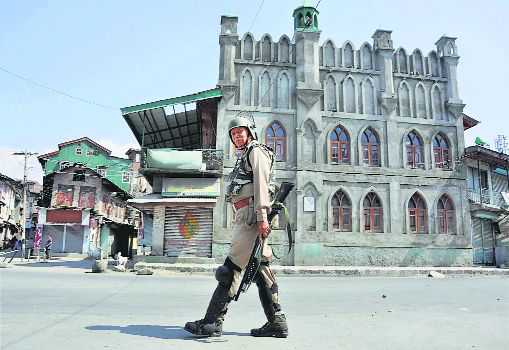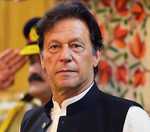Comment
The Big Five on Kashmir
Unrealistic to expect unequivocal backing to India’s case
Posted at: Sep 2, 2019, 6:32 AM
Last updated: Sep 2, 2019, 6:32 AM (IST)

At odds: The matrix is complicated, since no Western power accepts what New Delhi did on August 5, or the lockdown in the Valley.
MK Bhadrakumar
Former Ambassador
Former Ambassador
No Indian Prime Minister would ever have visited the host country of an international summit to which he was invited within the week twice — one to attend the conference and a previous one just four days before to ensure the event wouldn’t embarrass him. That was what PM Modi did during the recent G7 summit at Biarritz, France, apprehending that the crisis in J&K might figure for discussion at the exclusive gathering of the leaders of the seven industrial countries.
The situation around Kashmir did come up for discussion among the G7 leaders. But France heeded Modi’s desperate plea and kept it out of the summit leaders’ declaration. Indeed, Modi since tweeted euphorically about the robust ‘InFra alliance’. However, there is nothing like free lunch in diplomacy. No sooner did the dust settle on the G7 summit (August 24 -26), than France reverted to the conversation between Modi and President Macron. By August 29, France’s National Security Adviser Emmanuel Bonne had landed in New Delhi to pick up the threads of that one-on-one. A leading Indian daily reported — citing officials in Paris — that ‘on the table for the high-level discussion would be the next order for (Rafale) fighter aircraft, among other defence equipment… France is keen to pick up another order of Rafale fighter jets… In addition, France is keen to add more Scorpene submarines to India’s inventory… France is also keen to sell about 18 Caracal helicopters for the Indian Coast Guard, as well as almost 100 heavy Panther helicopters for the Indian Navy.’
Meanwhile, US President Trump, whom Modi met in Biarritz on August 26, too, was extraordinarily accommodative when he signalled that he would take the latter for his word that he ‘really feels he has it (J&K) under control’ and expected that ‘they (India and Pakistan) will be able to do something that will be very good.’ Trump preferred to focus right now on India’s plans to unveil shortly certain big investment plans in the US energy sector. Again, Russia, which is perhaps more empathetic than any other big veto-holding power in the UN Security Council — at least its diplomats posted in Delhi — over J&K, also was pleasantly surprised last week to see the Modi government make the initial payments for the $6 billion deal for the supply of the S-400 missile defence system. Delhi was dithering and has now crossed the Rubicon. This comes in the run-up to Modi’s visit to Russia on September 4-6, when Kashmir is sure to figure in his one-on-one with President Putin. (Modi may also announce some big investment projects.)
India is holding out seductive big-ticket items to three out of five heavyweights in the UNSC, whose support on Kashmir is crucial at a juncture when China is truculent and Britain remains ambivalent and distracted. The locus of India’s foreign policy has shifted to appeasement of big powers. Yet, it is unrealistic to expect the big powers to give unequivocal backing to India’s case. At the recent UNSC consultative meeting on ‘India-Pakistan questions’, none of the P5 accepted India’s thesis that the situation around J&K was an ‘internal matter’. They all urged India and Pakistan to discuss the Kashmir dispute bilaterally. They are concerned over the ground situation and disfavour further precipitate moves that would aggravate tensions.
The Western powers are keeping all options in a dynamic situation. The human rights situation in Kashmir used to be ignored by the outside world, but the narrative has changed. The narrative taps into a Western worldview that has grown weary of war and hatred. The tragic stories and images from the Valley are striking home. Therefore, the contestation over J&K is going to be fought and won — or lost — in the democratic world (where Russian stance becomes irrelevant.) The matrix is complicated, since no Western power accepts what Delhi did on August 5, or the lockdown in the Valley.
Macron’s remarks while meeting Modi, contrary to doctored versions in Indian media, reflected the paradigm shift — Paris is watching developments in J&K closely; France will ‘remain attentive to ensure the interests and rights of the civilian populations are properly taken into account in the territories on both sides of the ceasefire line’ (note: ‘ceasefire line’); it is the responsibility of both India and Pakistan ‘to avoid any deterioration on the ground that could lead to an escalation.’
Curiously, a US State Department official echoed the French stance on August 29, full three days after the Modi-Trump meeting in Biarritz: ‘We continue to be very concerned by reports of detentions and continued restrictions on residents. We urge respect for human rights, compliance with legal procedures, and inclusive dialogue with those affected.’ A senior board member of Stratfor, US intelligence think tank, wrote last week, ‘The question is, what do the people of Kashmir — those in the Indian-held two-thirds of the region, the Pakistani-held western third and the Hindu Kashmiris who were expelled from their homes in 1947 and are still officially displaced — want? No one is asking them, but that may be the only way to save them, and the world, from nuclear war.’
By measuring the international reaction in coffee spoons, Indian analysts overlook the sweep of current history in which these storm clouds are gathering. Imran Khan’s powerful metaphor drawing comparison between the present Indian leadership and Nazi Germany aims to tap into the deepening mainstream Western perception of Modi’s India as a belligerent, intolerant, majoritarian state rooted in fascist ideology.
COMMENTS
All readers are invited to post comments responsibly. Any messages with foul language or inciting hatred will be deleted. Comments with all capital letters will also be deleted. Readers are encouraged to flag the comments they feel are inappropriate.The views expressed in the Comments section are of the individuals writing the post. The Tribune does not endorse or support the views in these posts in any manner.
MOST READ

2 arrested after violent clashes as Pakistani groups lead Kashmir protest in UK
04 Sep 2019 | 12:13 PM
 MK Bhadrakumar
MK Bhadrakumar 











No comments:
Post a Comment